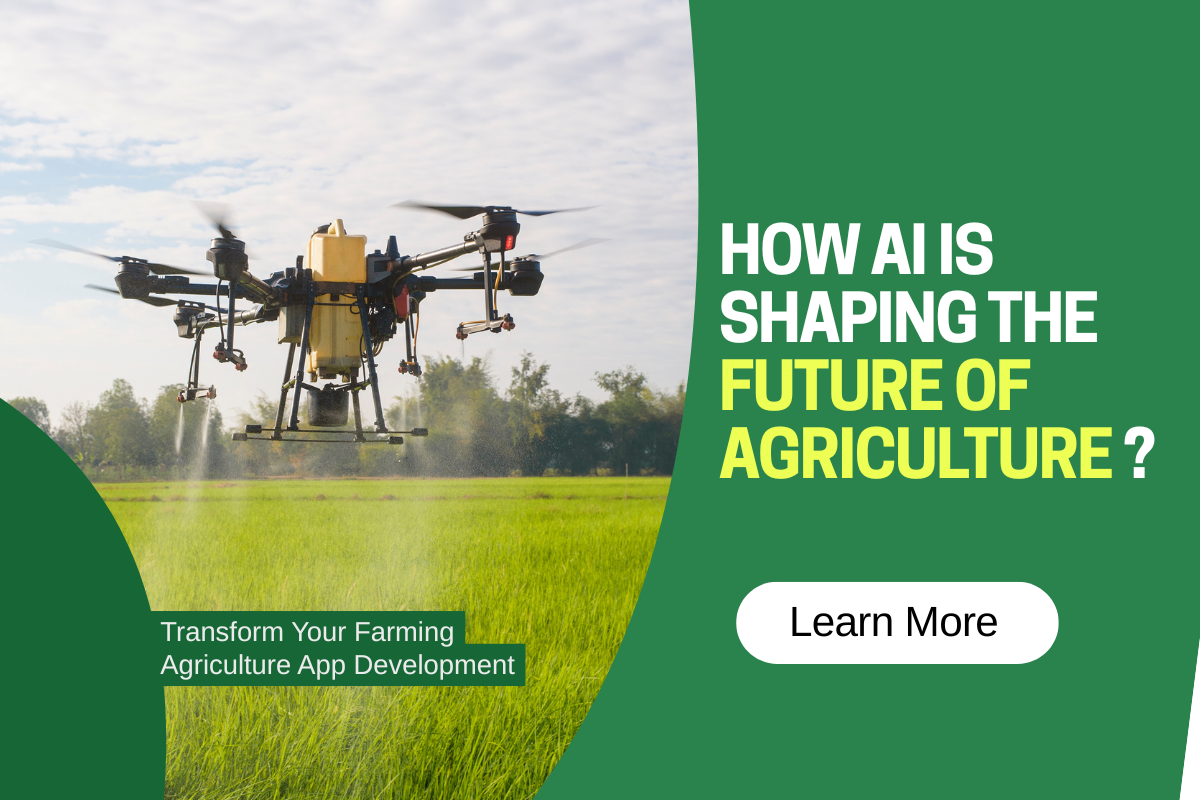How AI is Shaping the Future of Agriculture in Saudi Arabia?

Saudi Arabia, a nation historically reliant on oil, is now investing heavily in sustainability and innovation across sectors—including agriculture. In a country where arable land is scarce, water resources are limited, and food imports are high, artificial intelligence (AI) has emerged as a vital solution to ensure food security and agricultural productivity.
As part of Vision 2030, Saudi Arabia is embracing AI to modernise its agricultural sector. From precision farming and weather forecasting to smart irrigation and livestock management, AI technologies—especially generative AI—are transforming how agriculture is practised in the Kingdom.
In this blog, we’ll explore how AI is revolutionising agriculture in Saudi Arabia and how partnering with a mobile app development company in Saudi enables smart farming solutions for local and regional challenges.
The Agricultural Landscape in Saudi Arabia
Agriculture accounts for a small portion of Saudi Arabia's GDP, yet it remains a strategic priority for economic diversification and food independence. With only 1.5% of the land being arable and limited access to freshwater, traditional farming methods are no longer sustainable.
Some of the biggest challenges include:
-
Water scarcity and inefficient irrigation
-
Soil degradation in desert environments
-
Dependence on food imports
-
Shortage of agricultural labour
-
Extreme climate conditions
To address these issues, the Kingdom is leveraging technology—especially artificial intelligence—to build a more resilient, efficient, and sustainable farming ecosystem.
How AI is Transforming Agriculture in Saudi Arabia
1. Precision Agriculture with AI and IoT
AI-powered systems, paired with IoT sensors and drones, are enabling precision agriculture—a method that allows farmers to monitor and manage crop health, soil moisture, nutrient levels, and pest activity in real time.
-
Impact: Farmers can make data-driven decisions on when, where, and how much to irrigate or fertilise, improving crop yields while conserving water.
-
Example: Sensors detect dry patches in the soil and automatically trigger irrigation systems only where needed, reducing water consumption by up to 50%.
A mobile app development company in Saudi plays a crucial role by developing user-friendly platforms that help farmers access and act on this real-time data via mobile apps—right from their fields.
2. Generative AI in Crop Planning and Simulation
Generative AI takes agricultural planning to the next level. Unlike traditional AI, which analyses existing data, generative models can simulate entire crop cycles, environmental conditions, and planting strategies.
-
Use Case: A generative AI model can create various planting scenarios based on changing climate, soil type, and available water. It then recommends the most productive and sustainable strategy.
-
Benefit: Reduces trial-and-error, saves time, and boosts productivity.
Partnering with a Generative AI Development Company helps agribusinesses in Saudi Arabia build custom generative models tailored to desert agriculture and water conservation goals.
3. AI-Powered Weather Forecasting and Pest Prediction
Climate unpredictability is a major challenge in Saudi farming. AI-driven weather models process satellite imagery, historical weather data, and real-time sensor data to provide highly accurate forecasts.
-
Application: Farmers receive early alerts on sandstorms, droughts, or pest outbreaks via mobile notifications.
-
Result: Timely action prevents crop loss and reduces operational risk.
With smart integration, a mobile app development company in Saudi can create bilingual (Arabic/English) apps that send automated, location-specific alerts directly to farmers.
4. Smart Irrigation and Water Management
Saudi Arabia ranks among the top countries facing water scarcity. AI is being used to optimise irrigation systems by analysing moisture data, weather forecasts, and plant needs.
-
Technology: Smart irrigation controllers powered by AI decide the optimal irrigation schedule.
-
Outcome: Conserves water without compromising crop yield—a critical balance in desert farming.
Combining mobile interfaces with backend AI logic, a mobile app development company in Saudi can empower even small-scale farmers to adopt intelligent irrigation practices through simple mobile dashboards.
5. Livestock Monitoring and Health Management
Wearable AI sensors on livestock allow real-time tracking of movement, health conditions, and reproductive cycles.
-
AI Use: Algorithms analyse animal behaviour to detect illnesses or irregularities before they become serious.
-
Outcome: Improves animal welfare, productivity, and reduces veterinary costs.
Saudi livestock farms are increasingly adopting such AI solutions, supported by smart apps built to manage large herds efficiently.
Role of Generative AI Development Companies in Smart Agriculture
Generative AI is transforming agriculture from reactive to predictive and proactive. Here's how a Generative AI Development Company can support smart agriculture in Saudi Arabia:
● Custom Model Development
-
Simulate different agricultural conditions for accurate crop planning.
-
Generate synthetic data to train AI systems in regions where agricultural data is scarce.
● Digital Twin Technology
-
Create virtual replicas of farms that simulate real-world responses to environmental changes.
-
Optimise fertiliser usage, harvest times, and irrigation levels before implementing on the ground.
● Advanced Language Models
-
Build Arabic-language AI tools for local farmers, enabling voice-command farm management in regional dialects.
These generative models help overcome the unique challenges of Saudi agriculture while increasing efficiency and profitability.
Importance of Local Mobile App Development Companies
While AI models provide intelligence, mobile applications are the bridge between AI systems and the end-user. That’s where a skilled mobile app development company in Saudi becomes essential.
What They Bring to the Table:
-
Localisation: Arabic language support and culturally relevant UX/UI.
-
Offline access: Essential for farmers in remote areas with limited connectivity.
-
Integration: Connect AI models with IoT hardware, cloud platforms, and payment gateways.
-
Compliance: Ensure app security and data handling align with Saudi regulations like CITC and NCA.
With the right development partner, AI-powered features can be translated into simple, actionable tools usable by anyone—from large agri-firms to small rural farmers.
Real-World Examples in the Region
-
NEOM’s Smart Agriculture Zones: Saudi Arabia’s NEOM is incorporating AI and robotics in its large-scale farming ecosystems, using generative models for vertical farming, greenhouse management, and aquaponics.
-
Red Sea Farms: This Saudi-based agritech startup uses AI for climate control, saline water usage, and predictive crop analytics.
These examples show how the Kingdom is investing in AI-powered agriculture at both startup and national levels.
Final Thoughts
The future of farming in Saudi Arabia will not be defined by tractors and ploughs—but by algorithms, sensors, and intelligent models. As the nation moves toward sustainability, self-sufficiency, and economic diversification, AI is the most promising lever for agricultural innovation.
Whether it's conserving water in the desert, simulating future crop yields, or automating livestock care, the integration of AI is redefining what's possible in Saudi agriculture.
By partnering with a trusted Generative AI Development Company and a capable mobile app development company in Saudi, agriculture businesses can harness the full power of technology to grow smarter, faster, and more sustainably.








